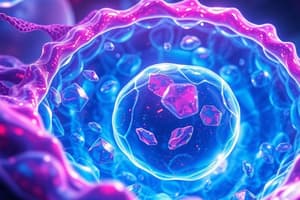Podcast
Questions and Answers
What is the innermost membrane surrounding the ovum called?
What is the innermost membrane surrounding the ovum called?
- Vitelline Membrane
- Zona Pellucida
- Corona Radiata (correct)
- Ooplasm
Which type of membrane is characterized by being secreted by follicular cells?
Which type of membrane is characterized by being secreted by follicular cells?
- Tertiary Membrane
- Secondary Membrane (correct)
- Outer Membrane
- Primary Membrane
In which type of animals is the tertiary membrane notably present?
In which type of animals is the tertiary membrane notably present?
- Fish
- Amphibians only
- Mammals
- Reptiles and birds (correct)
What substance is primarily formed in the cytoplasm of ova during their growth period?
What substance is primarily formed in the cytoplasm of ova during their growth period?
Which layer is the outermost membrane structure of the ovum?
Which layer is the outermost membrane structure of the ovum?
Flashcards are hidden until you start studying
Study Notes
Protective Membranes of the Ova
- Ova are protected by primary, secondary, and tertiary membranes
- Primary membrane: innermost layer, produced by the egg cytoplasm and found in all animals. It's also known as the vitelline membrane.
- Secondary membrane: known as the zona pellucida, found in mammals only, and secreted by the follicular cells.
- Tertiary Membranes: additional layers secreted by the oviduct when the egg passes through it, examples include the jelly-like material in frog's eggs or the albumen layer and shell in birds and reptiles.
Classification of Ova
- Ova are classified by the amount of yolk they contain.
Diagram of Ovum
- An ovum is comprised of various components: corona radiata, zona pellucida, vitelline membrane, nucleus (germinal vesicle), ooplasm (the main part of the ovum), and yolk.
- Frog eggs are a good example of ova with lots of yolk surrounded by a jelly-like tertiary membrane.
Studying That Suits You
Use AI to generate personalized quizzes and flashcards to suit your learning preferences.




